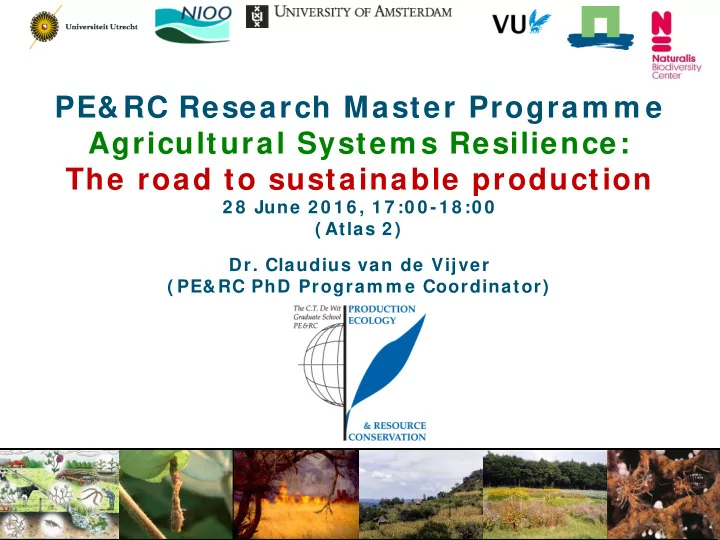

PE&RC Research Master Program m e Agricultural System s Resilience: The road to sustainable production 2 8 June 2 0 1 6 , 1 7 :0 0 -1 8 :0 0 ( Atlas 2 ) Dr. Claudius van de Vijver ( PE&RC PhD Program m e Coordinator)
This presentation Introduction to PE&RC • Mission • Research areas • Participating groups • Tasks • PE&RC Training and Education The PE&RC Research Master Programme in Ecology • What is the Research Master Programme • Overview of the Programme • Time-line
Production Ecology & Resource Conservation Mission Understanding the functioning of (agro) ecosystems to design and enable the development of sustainable, multifunctional production and land use systems
PE&RC Research Fields Variety levels of scale, integration and type of research 4
Focal Areas of research • Learning from nature How to foster ecology-based o sustainable development, optimally using natural ecosystem services. • Global change, food and the environm ent global Addresses these global issues change o using an integral approach that involves social, economic and environmental learning one sustainability, considering from health systems as networks. nature • One health Integrated / systems o approach to health of man, animal and plant including nutrition
PE&RC • National Graduate School • Partners: • Wageningen University (21 groups) • Behavioural Ecology • Soil Geography and Landscape • Crop and Weed Ecology • Mathematical and Statistical Methods • Crop Physiology • Nematology • Entomology • Plant Breeding • Farm Technology • Plant Ecology and Nature Conservation • Farming Systems Ecology • Plant Production Systems • Forest Ecology and Forest Management • Remote Sensing • Genetics • Resource Ecology • GIS • Soil Biology and Biological Quality • Horticulture and Product Physiology • Virology • Soil Physics and Land Management
PE&RC • National Graduate School • Partners: • Wageningen University (21 groups) • DLO Research Institutes (PRI / ALTERRA) • Utrecht University (Ecology and Biodiversity) • NIOO (Terrestrial Ecology, Microbial Ecology, Aquatic Ecology, Animal Ecology) • Naturalis Biodiversity Center • University of Amsterdam (IBED) • Vrije Universiteit (Systems Ecology and Animal Ecology)
Tasks PE&RC • Safeguard / enhance quality and progress of academic research and researchers (PhD, post-docs and academic staff) • Facilitate / monitor PhD research process and procedures • Initiate, promote, facilitate PhD training / education activities • Stimulate interdisciplinary activities among research groups • Form and control coherence of the university research programme in an international context
Basis of PhD Training and Education 1. Doing a PhD is a test that the candidate can function as an independent scientist 2. Societal relevance of science is increasingly required • Increased demand to contribute to solving global challenges • Requires inter/ transdisciplinary research approaches • Moreover: Increasing % PhD graduates follow careers outside academia Including stakeholder involvement
PE&RC’s Philosophy 1. Doing a PhD is a test that the candidate can function as an independent scientist 2. Societal relevance of science is increasingly required • Increased demand to contribute to solving global challenges • Requires inter/ transdisciplinary research approaches • Moreover: Increasing % PhD graduates follow careers outside academia 3. Demand for a new-generation scientist with a diverse set of competences and skills T-shaped skills
Basis of PhD Training and Education T-Shaped skills Horizontal bar: Broadening Placing research in societal context Skills & Competences Scientific knowledge Vertical Bar: Deepening
Adopting T-shaped skills: The PhD Training and Education Program m e Focus on: • (Inter)Active (participatory) training
PE&RC Research Master Program m e Agricultural System s Resilience: The road to sustainable production 1. Why? • PhD’s who have followed a Research Master Programme can apply for an NWO Grant (4 PhD’s) • Call for proposals: Focus on Systems Resilience and sustainability of production systems and sustainable management of natural systems. 2. Linked to current 2-year Science oriented MSc Programme (120 EC) 3. Optional choice in regular MSc Programme and can be chosen in MSc programmes: • Biology • Plant Sciences • Organic Agriculture • Earth and Environment (Soil Science) • Forest and Nature Conservation • (Inflow from other studies also foreseen)
PE&RC Research Master Program m e Agricultural System s Resilience: The road to sustainable production 4. Largely overlaps with running MSc Programme 5. More focus on: • A career in research/ science • The New Generation Scientist (From fundamental knowledge to application) 6. Therefore in the Research Master more focus on: • In depth scientific knowledge and insight • Skills and competences required to function as a scientist in an academic environment • Participatory learning
PE&RC Research Master Program m e Agricultural System s Resilience: The road to sustainable production 7. The Research Master involves: • Master courses (48 ECTS) • Master Thesis (30-36 ECTS) • Internship (24-30 ECTS) • Obtain insight in the challenges at stake in the field you are interested in • Translate into a fundamental research question(s) which will be the central element of your PhD project proposal • Obtained done via participatory learning (co-learning)
PE&RC Research Master Program m e Agricultural System s Resilience: The road to sustainable production 7. The Research Master involves: • Master courses (48 ECTS) • Master Thesis (30-36 ECTS) • Internship (24-30 ECTS) • Research Master Cluster (RMC) Proposal Writing (12 ECTS): • Skills training • Writing of PhD proposal based on outcome internship • Specific training on academic development given by PE&RC 8. Having accomplished the above allows for a Research Master 9. Regular MSc degree with a PE&RC Research Master Certificate 10. To register for this master programme send an email to Claudius van de Vijver including: • CV • Letter of motivation • Letter of recommendation from a supervisor or study coordinator
Any questions
Recommend
More recommend